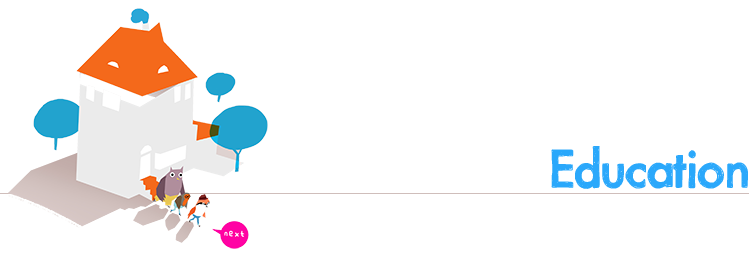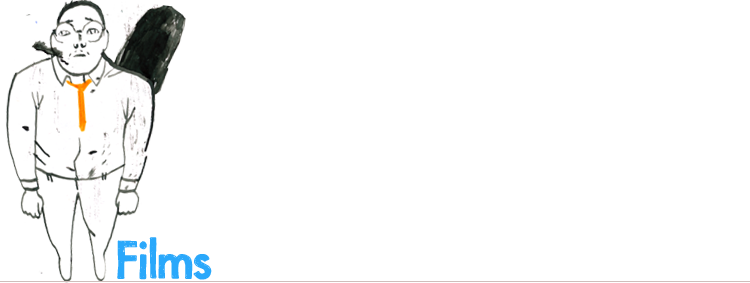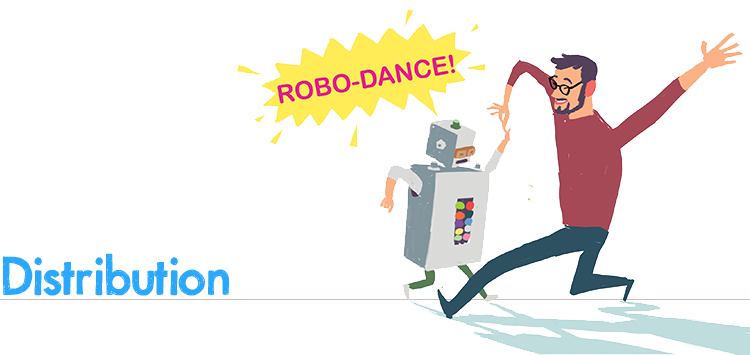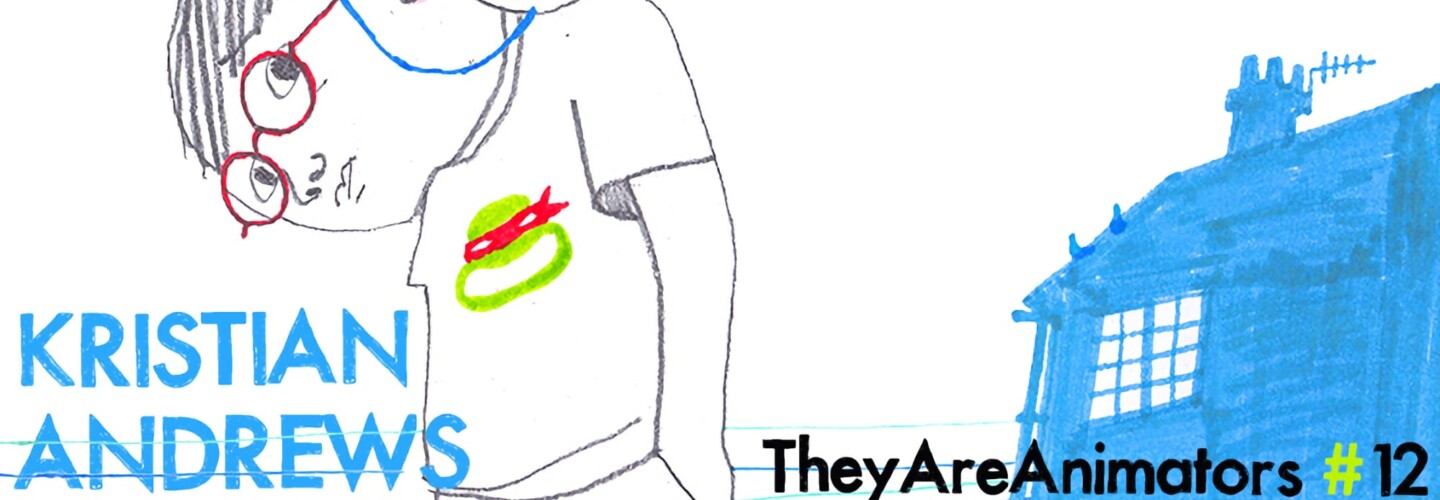The first time I ever saw the work of Kristian Andrews, I was struck by how his short films Rabbit Punch and Bald Dad made me instantly drift away to my own childhood memories. His autobiographical films, created whilst studying at the Royal College of Art, feel like the embodiment of British childhood for someone of my generation – when as kids we spent as much time outside as possible. We were determined to delve into the animator’s headspace by inviting Andrews to become the latest filmmaker featured in DN’s TheyAreAnimators series.
“For as long as I can remember I’d always wanted to be a car designer”.
A big box of my Dad’s old matchbox cars consumed my imagination as a 4 year old. The gift of a remote control red Ferrari from my grandparents was a source of inspiration, that quickly turned to frustration when I realized its fatal design flaw; it couldn’t reverse. Around the time I had to choose my GCSE options my Dad took me to the RCA show to see their famous vehicle design course. After looking at the cars I accidentally watched Richard Kenworthy’s The Littlest Robo (1999) and all my thoughts of contributing to the planet’s environmental demise melted.
Like ‘Car designer’ the term ‘Animator’ isn’t one that really fits what I do. ‘Animator’ is a word that implies ‘technician’ rather than ‘artist’. People talk about ‘The craft of animation’, but it doesn’t pay to be too precious about a discipline that’s constantly redefining itself with interpolated keyframing replacing frame by frame animation and then performance capture replacing interpolated keyframing… In my next film I’m going to utilise performance capture and not much ‘animation’ because when you’re not an animator, you’re free to use whatever technique suits.

When I was making my graduation films, I didn’t want them to have the RCA stamp of quality but instead I wanted them to have the RCA stamp of scratchy-wobbliness like Jonathan Hodgeson’s Nightclub (1983). At the time there seemed to be so many slickly produced, well rendered student films that I wanted to do something a bit cruder and dirtier like JJ Villard’s Son of Satan (2003).
A good Norman McLaren quote to use to sound clever is “Animation isn’t the art of drawings that move it’s the art of movements that are drawn”. Although it’s a lovely bit of rhetoric, I never see my work in that latter category. It seemed important to make viewers aware that these were real drawings moving because of a real human hand in my college films.
Looking back, college was an important time of experimentation but I suppose in the back of my mind was that voice asking: ‘What kind of filmmaker are you going to be for the rest of your life!?’. I don’t ever want to know the answer to this question, I just hope that each of my films has their own voice.

I draw a lot from life and when you regularly engage in a practice like that you find ways of simplifying shapes and ways of recording things quickly that come back to you when you need them. Necessity encourages you to develop short-cuts and idiosyncrasies to help you record just the essential information. Drawing is a bit like a language in this way. When it came to making my college films I tried to use that approach. I laid out shots simply, so they overlapped and used ‘negative space’ in the same way as I did in my sketchbook. There are stylistic choices that are specific to each film as well, in Bald Dad it was important that I restrict myself to a very specific type of felt tip and in my new film, I am limiting my polygon count and bit depth.
There’s a lot of catharsis going on in my films. But they are by no means documentary accounts; Rabbit Punch for example does contain a lot of characters inspired by people I knew growing up and there are events and situations that are derived from personal experience, but it’s all repackaged in a neat, digested, whole that is unlike any lived experience.
I’ve always been interested in presenting new views of this world rather than entirely new worlds with animation. Englishness can sometimes have some pretty awful connotations of colonialist jingoism or Hugh Grant apologetic bumbling. But, I suppose, in recording simple things like getting a bus, going camping, giving blood or going for a bike ride I suppose, at a push, you could say there’s some sense of a shared English experience to be gleaned.
I learnt loads of new tools and techniques as a student but this notion of ‘a production process’ has always alluded me. Locking things down to a state where they can’t be changed for the better later down the line seems perverse.
All I really know about the way I made these films is that they wouldn’t have been anywhere near as good without the help I received from some lovely friends including Ed Barrett, Joe Cook, Ian Sargent, Matthias Hoegg, Tom Judd, Edmund Conway and Carl Prekopp.

I’m really proud to direct at StudioAKA and on the rare occasions when I’m not having to ‘punch above my weight’ by pitching competitively for commercial work against my fellow directors Marc Craste, Philip Hunt, Steve Small, Grant Orchard, David Prosser or Eamonn O’neill, I’m sometimes lucky enough to collaborate with them.
I enjoy directing commercially because it’s so totally different from making personal work. Often a brief is a proposition of a totally different way of working you would never have considered in your personal work. Working commercially is much more of a collaboration. In a personal work you tend to choose your collaborators but commercially they choose you, so it’s a different kind of partnership. In commercial work you have to try and get the best out of each other. Sometimes you hear directors blaming the failure of a project on the shortsightedness of agency or client, but as part of that team you’re ultimately criticising a relationship that you’re part responsible for.
When I directed the Olympic Trail idents for the BBC, I worked with Marc Craste who was an incredible instructive force who lead me through this collaborative process the way it should be done.

The general rule is festivals first, internet after. A film has its 2 year festival lifespan in which it dines out with you, takes you on free holidays and if you’re lucky wins you awards. Sadly once that lifespan expires the film passes on to a better place, the internet, where people write it nice epitaphs. This is currently the best way I can see of short filmmakers making any kind of financial gain from their work. However there are other models emerging and I plan to do something very different with my next film launch… [TEASE!]
It’s easy to see the internet as the future, especially when it comes to independent film distribution. I love the lateral hierarchy of sites like Vimeo, that allow everyone direct access to a community where audience and filmmaker overlap.
There are ways for the filmmaker to profit financially online with their pay per view service as well as a tip jar. However, for the majority of filmmakers this doesn’t add up to a real income as the site charges a percentage of earnings, plus membership fees whilst ultimately the filmmaker drives their traffic and consequently their share price.
Festivals on the other hand, present another option with a more traditional hierarchy. They are exclusive and profit financially from the works of filmmakers in a more obvious way to video hosting sites by selling tickets but they’re free to enter and they offer cash prizes, a free holiday and free drinks!
There are so many ways of consuming moving image and they’re all great as they drive the popularity of the form. Aside from the financial side of things, for me it’s the atmosphere of the festival that makes them different. Although the quality of sound and image are sometimes lacking and a long festival screening can be the worst, the thrill of seeing a good film in that situation makes the festival where I want people to see my films.
I imagine that the paradigm that exists now will seem strange in a few years and we’ll see more of a cross over as real life festivals are hosted by Vimeo and more films are hosted digitally by Annecy.

I’m going to live in a monastery in France for a month on a Residency to make a film later this year. But before that, did I mention I’m currently making a new film in INCREBIDLE 3D CGI called Nomad X and posting scraps of inspiration and tidbits of work here?
In my new film the root of the idea is based on personal experience but it’s obscured and told from the perspective of a heartbroken computer games reviewer. I suppose it all comes back to the adage ‘Write what you know’ and for me that means using film to try and talk about what really goes on and to try and make sense of it.
“Don’t take advice from anyone”.


